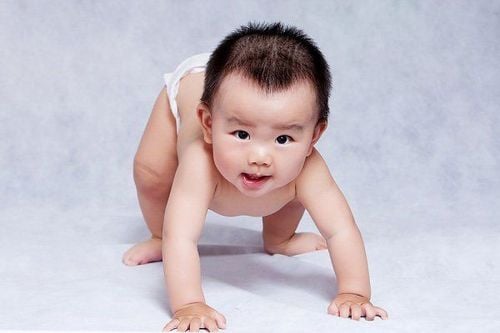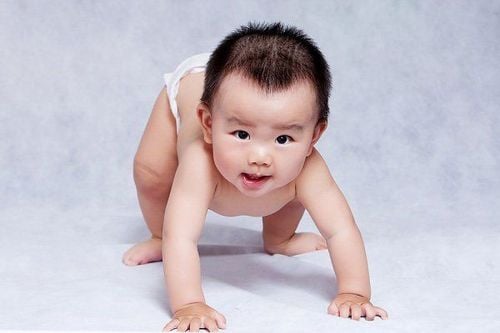This is an automatically translated article.
The article is professionally consulted by Master, Doctor Huynh Bao Toan - Department of Pediatrics - Neonatology - Vinmec Nha Trang International General Hospital.At the age of 13 months, children will begin to learn to walk, talk, explore the world around them... , less sickness, disease.
1. Child development at the age of 13 months
1.1 Height and weight of a 13-month-old babyAccording to the World Health Organization (WHO), the average weight of a 13-month-old boy is 9.8 kg and a 13-month-old girl is 9.1 kg. The average height of a 13-month-old boy is 76.9cm and that of a 13-month-old girl is 75.1cm.
However, every baby will develop differently and the number on the scale is not absolute. As long as the child develops evenly, is positive in height and weight within the standard levels in the growth chart, parents can feel secure.
1.2 What can a 13-month-old baby do? Speech: Your baby is learning to say single words, 1 or 2 words. The child is making progress in communicating with adults, for example by making signs, instead of just crying as a baby; Mobility: Most 13-month-olds are already standing, can move around the room while clinging to a table or chair, or can walk on their own without assistance. However, there are still children who learn to stand and walk quite late. Some babies don't start standing until 18 months, learning to walk; Ability to express emotions: Children can express their emotions of anger, sadness, fear, opposition, ... quite clearly.

Bé 13 tháng tuổi bắt đầu tập đi và khám phá thế giới xung quanh
2. Diet for 13-month-old children
At the age of 13 months, with proper weaning training, the child has acquired relatively good skills in eating and has been able to eat a variety of foods. Parents should continue to provide their children with a balanced diet and introduce them to other foods.
2.1 What does a 13 month old baby eat? In addition to 3 main meals, children need to eat 2-3 more snacks per day. Need to diversify food groups: Green vegetables, fruits, cereals, milk and protein,... Essential groups of nutrients and foods for babies include:
Calcium supplements from: Milk, green leafy vegetables, tofu , broccoli; Iron supplement: green vegetables, beef; Add fiber from: Green vegetables, pureed beans, bananas,... Protein supplements from: Meat, fish, eggs, milk,...; Add starch from: Rice, porridge, vermicelli, pho,... Add fat from: Cooking oil, butter,...

Khi được 13 tháng tuổi trẻ đã có được kỹ năng tương đối tốt trong việc ăn
2.2 How much is enough for a 13-month-old baby? According to doctors, most toddlers will need about 1,000 calories a day. It is estimated that when practicing weaning for children, parents should arrange the child's portion size to be about 1/4 the amount of an adult's food. Then, parents can observe the baby choose what to eat, how much to eat based on the baby's own needs.
Sometimes, children are very picky eaters, not interested in any food and only drink milk. The amount of milk that children drink needs to be calculated reasonably in terms of calcium, in balance with other drinks that the baby consumes. Specifically, a 13-month-old baby should get about 700 mg of calcium per day. If children do not eat or drink other calcium-containing foods, they will need to consume about 700ml of milk. If the child eats more foods containing calcium, the amount of milk consumed can be reduced.
2.3 Notes on nutritional care for a 13-month-old baby If the mother is still breastfeeding, she should continue to maintain this because the baby will receive a lot of nutrients from breast milk; Formula and whole milk can be added to your baby's diet; Provide enough water for children; Practice washing your baby's hands before eating to ensure hygiene.

Chăm sóc răng miệng cho trẻ 13 tháng tuổi
3. Dental care for 13-month-old baby
Children should not be breastfed, bottle-fed, drink soft drinks, juices, eat dried fruits, candies, cakes,... before going to bed to avoid tooth decay; If the child likes to suck, suck on something to sleep easily, a pacifier should be used; For babies who have been breastfed and bottle-fed before sleeping, they should use a damp cloth to gently wipe their baby's teeth to keep their teeth clean; Children should not eat snacks often, especially sweets; If you suspect that your child has dry mouth, it is necessary to take him to the dentist for advice and treatment; Encourage your child to drink from a cup or cup instead of a bottle; Brush your child's teeth at least twice a day, take them for regular dental check-ups; When children are prescribed medicine, it is advisable to consult a doctor to use a medicine that does not harm tooth enamel. When taking care of nutrition and teeth for 13-month-old children, parents need to follow the advice of doctors and nutritionists to help children develop comprehensively both physically and mentally.Children in the period of 13 months old are very susceptible to respiratory problems, respiratory infections and gastrointestinal infections if they eat solids early or the storage and preparation of milk is not guaranteed. In particular, during this period, children may be slow to speak, slow to move... so parents need to pay special attention to caring for and providing adequate nutrition for children.
In addition, parents should also apply some methods of changing habits and improving nutrition to support the child's teeth to develop better.
Besides, parents also need to supplement their children with essential micro-minerals such as zinc, lysine, chromium, selenium, vitamin B1, ... to fully meet the nutritional needs of children. The addition of these essential vitamins also supports digestion, enhances nutrient absorption, improves anorexia, and helps children eat well. Parents can simultaneously apply dietary supplements and functional foods derived from nature for easy absorption. The most important thing is that improving your baby's symptoms often takes a long time. The combination of many types of functional foods at the same time or continuously changing many types in a short time can cause the baby's digestive system not to adapt and completely not good. Therefore, parents must be really patient with their children and regularly visit the website vimec.com to update useful baby care information.














